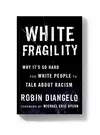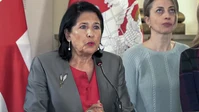- 2
- 6
- 5
- 13
On September 9, Delilah Barajas, who reviews TV shows and horror movies on TikTok, ditched her usual content to talk about a real-life suspenseful scenario: the showdown between cartel members that caused Culiacán, her hometown in the Mexican state of Sinaloa, to go into a self-imposed lockdown.
Heavy gunfire could be heard throughout the city, littered with burned cars and dead bodies, as two factions of the powerful Sinaloa cartel — formerly led by Joaquín "El Chapo" Guzmán Loera — fought each other.
In her video, a teary-eyed Barajas talked about the convoys of desvividos lying in the streets. "It's like The Purge movie," she said. Her post quickly went viral.
"Desvividos," which translates to "unalived," is not normally used in Mexican Spanish. Barajas, and dozens of other TikTok creators, have used the term to refer to the murder victims of the ongoing cartel-related violence to bypass what they consider TikTok's arbitrary moderation policies. The word is part of a growing collection of euphemisms that TikTok users have created and adopted to avoid having their accounts blocked. Rest of World spoke with four creators in Culiacán who said their videos about violence are being flagged, taken down, or have reduced visibility on the For You page. They said they have received warnings that their accounts are at risk of being deactivated.
Creators have identified other euphemisms that fly under the platform's moderation radar: levantón (getting picked up) instead of secuestro (kidnapping), civiles armados (armed civilians*)* instead of narcos (drug dealers or drug kingpins), and bom bom instead of grenades and shootouts.
TikTok's community guidelines do not allow gory, gruesome, disturbing, or extremely violent content, but specific images and words used to talk about cartel-related violence are not blocked or prohibited, a TikTok spokesperson told Rest of World.
"We recognize that some content that would otherwise violate our rules may be in the public interest to view," the spokesperson said. "The most important factor we consider in looking at public interest exceptions is context, such as whether the content is raising awareness or criticizing harmful behaviors."
Words that creators said trigger TikTok's content moderation warnings include balacera (shootout), tortura (torture), and narcomantas, which refers to messages left by cartels on cloth banners in public spaces. Content that mentions El Chapo has also been taken down*.*
TikTok said these terms are not banned or prohibited on the platform, as they "are frequently used in counter-speech or news contexts" in Mexico. Discussions about violent political organizations, like drug cartels, are allowed as long as violence is not promoted, the spokesperson said. According to TikTok, "El Chapo" is a banned term "unless its use is informative."
Héctor Frank, a content creator from Culiacán, the capital of Sinaloa, has been posting weekly updates on the violence since early September for his more than 1 million followers. "Unless it's an official news outlet, it seems that TikTok doesn't like people to talk about what's happening in terms of narco-violence," Frank told Rest of World.
Frank, who works as a TV reporter, has posted videos about the lavish lifestyles of drug kingpins in Sinaloa since 2022. When his content mentions El Chapo or San Malverde, an icon of narco culture, TikTok flags it for violating community guidelines, he said.
TikTok took down one of Barajas' videos where she talked about narcomantas. When she uploaded it again, the platform took it down for violating community guidelines but didn't specify how. "I hate it," she said.
Describing the attacks in Culiacán on TikTok is challenging because cartel-related violence is particularly gruesome. More than 120 people have been murdered or have disappeared since September, and the city is still in partial lockdown. According to local newspaper El Espejo, many of the victims have been found burned, mutilated, or tortured.
"Every day we wake up to six or seven murdered, decapitated, or tortured bodies," Fernando Gómez Bórquez, a TikToker from Culiacán, told Rest of World. He avoids using those words while recording videos for his followers, enunciating only the first syllable of triggering words like muerto (dead).
When his videos are flagged or taken down, Gómez Bórquez doesn't put up a fight. "I have other things to do with my family or at work instead of rerecording," he said.
Barajas, whose livelihood depends on online content creation, rerecords her videos when the platform takes them down, getting ever more creative. To describe bodies found with torture marks, she uses the word tortuga, or turtle, instead. Her followers catch on.
"Did she say 'turtle marks?'" a user named Abraham Kato commented on a video. Another user clarified that Barajas said "turtle" because using the actual term could lead to her video being banned.
In early October, Gómez Bórquez tried to post a video about how school children are often trapped in the crossfire. TikTok blocked the video from being posted, saying it violated community guidelines.
Last year, Frank tried to post a video about El Chapo's abandoned mansion in Culiacán. He referred to the drug kingpin by name until he realized it was triggering the platform's moderation process. He received a message from TikTok saying that the video couldn't be uploaded because it violated community guidelines. Frank rerecorded the audio, referring to El Chapo as "the most wanted man in the world." The video still comes up in search results for El Chapo, making him worry that TikTok's moderation policies are arbitrary.
Far from celebrating kingpins, reporting on them is a way to hold them accountable, said Frank. "They've had so much power and influence inside and outside Mexico, and they're a big reason why people in Culiacán are struggling."
One source of inspiration for the euphemisms is the popularity of the narcocorridos music genre, Anajilda Mondaca Cota, a retired social sciences professor from the Universidad de Occidente in Culiacán, told Rest of World. Songs from the genre narrate the lives and downfall of drug kingpins and cartels since the 1910s, and are peppered with euphemisms.
On social media, people use emojis to represent the words chapiza and mayiza, which refer to the dueling factions within the Sinaloa cartel that have become popular in narcocorridos in recent years. Chapiza, which means the people aligned with El Chapo, is represented by a pizza emoji; mayiza, referring to allies of Ismael "El Mayo" Zambada, the now-imprisoned leader of a rival faction of the cartel, is depicted using the cowboy emoji.
Some creators say that using euphemisms and emojis is risky.
This week, a TikToker who published an appreciation post referencing El Chapo and using pizza emojis, was murdered in Culiacán.
Frank said he avoids responding to comments that include pizza or cowboy emojis for fear of inadvertently engaging with cartels. "If a day comes where someone demands I take a video down because I'm saying too much, I'll reconsider. I don't want to have any problems," he said.
- 2
- 8
- 10
- 22
A 74-year-old Pennsylvania resident was arrested for allegedly threatening to kill former President Donald Trump a day before his Penn State rally, declaring: "I'd like to shoot that guy."
Paul J. Gavenonis — who uses she/her pronouns, according to the Centre County Public Defender's Office — was nabbed after she was overheard making the alleged threats while trying to buy a parking pass at the university's transportation office last Friday, the Lexington Herald Leader reported.
"I hate Donald Trump. I'd like to shoot that guy," Gavenonis allegedly said after making a gun-racking motion with her hand.
She also allegedly described climbing to the top of a building, saying "you can't take a gun in or the students will see it," according to an arrest affidavit.
An alarmed staffer alerted cops amid fears that the parking pass could potentially get Gavenonis closer to Trump's rally at the university. The former president held the rally on Saturday, October 26, 2024, just 10 days before the election.
When Penn State police and the Secret Service later questioned the suspect, Gavenonis allegedly laughed when asked if she believed she could kill the Republican presidential candidate.
"Probably. Yeah," Gavenonis is alleged to have said.
"Frankly, I hope somebody would get him," she added, according to the affidavit.
Gavenonis allegedly also told agents she had a rifle at her home.
It wasn't immediately clear if the alleged perp was trying to purchase the parking pass to gain access to the rally, or if she had plans to attend.
The Kansas City Star reported the suspect is a registered Democrat.
Gavenonis was charged with making terroristic threats and disorderly conduct.
She is being held without bail in Centre County Prison.
- 2
- 10
- 4
- 10
- 5
- 19

Also lots of people getting killed in Sinaloa.
Somehow AMLO's plan of just pretending the cartels don't exist didn't end the open warfare going on around the country.
- 1
- 12
Backstory: https://www.wboy.com/news/west-virginia/how-babydog-got-her-name-according-to-gov-jim-justice/
It's a cool dog but with all the money  they are taking in they can't afford nasal surgery
they are taking in they can't afford nasal surgery  to help it breathe??
to help it breathe??
- 3
- 11
- 2
- 3
- 21
- 31
!chuds TJD 
The Washington Post has been rocked by a tidal wave of cancellations from digital subscribers and a series of resignations from columnists, as the paper grapples with the fallout of owner Jeff Bezos's decision to block an endorsement of Vice President Kamala Harris for president.
More than 200,000 people had canceled their digital subscriptions by midday Monday, according to two people at the paper with knowledge of internal matters. Not all cancellations take effect immediately. Still, the figure represents about 8% of the paper's paid circulation of 2.5 million subscribers, which includes print as well. The number of cancellations continued to grow Monday afternoon.
A corporate spokesperson declined to comment, citing The Washington Post Co.'s status as a privately held company.
"It's a colossal number," former Post Executive Editor Marcus Brauchli told NPR. "The problem is, people don't know why the decision was made. We basically know the decision was made but we don't know what led to it."
Chief Executive and Publisher Will Lewis explained the decision not to endorse in this year's presidential race or in future elections as a return to the Post's roots: It has for years styled itself an "independent paper."
Few people inside the paper credit that rationale given the timing, however, just days before a neck-and-neck race between Harris and former President Donald Trump.
Former Executive Editor Marty Baron voiced that skepticism in an interview with NPR's Morning Edition on Monday.
"If this decision had been made three years ago, two years ago, maybe even a year ago, that would've been fine," Baron said. "It's a certainly reasonable decision. But this was made within a couple of weeks of the election, and there was no substantive serious deliberation with the editorial board of the paper. It was clearly made for other reasons, not for reasons of high principle."
Post reporters have revealed repeated instances of wrongdoing and allegations of illegality by Trump and his associates. The editorial page, which operates separately, has characterized Trump as a threat to the American democratic experiment. Several Post journ*lists say their relatives are among those canceling subscriptions.
The mass cancellations point "to the polarization of the times we're living in, and the energy people feel about these issues," Brauchli says. "This gave people a reason to act on this mood."
Brauchli has publicly encouraged people not to cancel their Post subscriptions in protest.
"It is a way to send a message to ownership but it shoots you in the foot if you care about the kind of in-depth, quality journ*lism like the Post produces," he said. "There aren't many organizations that can do what the Post does. The range and depth of reporting by the Post's journ*lists is among the best in the world."
Even at the rival New York Times, with a much higher circulation level, a significant protest might register in the low thousands. Earlier this year, Lewis, the Post publisher, had touted the paper's net gain of 4,000 subscribers as noteworthy.
Three of the top 10 viewed stories on the Post's website Sunday were articles written by Post staffers outraged by Bezos' decision. The top one was humor columnist Alexandra Petri's piece, headlined, "It has fallen to me, the humor columnist, to endorse Harris for president." More than 174,000 people read it online.
Resignations follow Bezos' decision
The decision by Bezos, the billionaire founder of Amazon, was first reported by NPR on Friday. In the days since, two columnists have resigned from the paper and two writers have stepped down from the editorial board.
One of those writers, Molly Roberts, warned of the possible consequences of the eleventh-hour decision to stay quiet rather than publish the editorial endorsing Harris. "Donald Trump is not yet a dictator," she wrote in a statement she posted on social media. "But the quieter we are, the closer he comes."
The other writer is David Hoffman, who accepted a Pulitzer Prize for editorial writing on Thursday, the day before Bezos' decision was made public. Pulitzer judges recognized him "for a compelling and well-researched series on new technologies and the tactics authoritarian regimes use to repress dissent in the digital age, and how they can be fought."
"For decades, the Washington Post's editorials have been a beacon of light, signaling hope to dissidents, political prisoners and the voiceless," David Hoffman wrote in a letter Monday explaining his decision to leave the editorial board. "When victims of repression were harassed, exiled, imprisoned and murdered, we made sure the whole world knew the truth.
"I believe we face a very real threat of autocracy in the candidacy of Donald Trump," Hoffman added in his letter to Editorial Page Editor David Shipley, which was obtained by NPR. "I find it untenable and unconscionable that we have lost our voice."
Hoffman says he intends to remain at the paper, saying he "refuses to give up on The Post, where I have spent 42 years." He writes of being launched on several projects, including "the expanded effort to support press freedom around the world."
Shipley held a contentious meeting on Monday with scores of opinion section staffers, who posed tough questions to the editorial page chief, including appeals for Bezos to address them.
As recently as last week, according to a person present, Shipley said he sought to talk Bezos out of his decision. Shipley added, "I failed."
Questions about Bezos' timing and motives
Former columnist Robert Kagan, an editor-at-large, explained his decision on CNN Friday night to resign from the paper.
"We are in fact bending the knee to Donald Trump because we're afraid of what he will do," Kagan said, noting that officials from Bezos' Blue Origin aerospace company met with Trump a few hours after the decision became public.
Blue Origin has a multi-billion dollar contract with NASA. During the Trump administration, Amazon sued the government after alleging it had blocked a $10 billion cloud-computing-services contract with the Pentagon over the then-president's ire about coverage in the Post, which Bezos owns personally.
Yet Bezos resolutely supported the staff's coverage during the Trump presidency (and has not interfered with reporting on his own business interests or personal life).
"In Trump's previous — and perhaps only — presidential term, at no point did Bezos flinch when it came to Trump," Brauchli says. "So there's no reason to think he is doing so on this."
Bezos brought in Lewis as publisher and chief executive at the start of the year in part, according to people with knowledge of the process, because he had worked closely with powerful conservative figures and had appealed successfully to conservative audiences.
Lewis had been editor of the Telegraph in the U.K., which is considered closely allied with the right wing of the Conservative party. He served as a top executive in London for Rupert Murdoch and became publisher and chief executive of his most prestigious title, the Wall Street Journal. After departing, he briefly became a consultant for the Conservative British Prime Minister Boris Johnson.
- 5
- 22
The Indian national had been jailed for 14 months in 2021 in relation to three counts of child s*x abuse images.
The paedophile had also been handed a sexual harm prevention order, as well as being required to sign the s*x offenders register for 10 years.
However, despite this, Home Office attempts to deport him have now failed after the man won a legal challenge on human rights grounds.
Lawyers for the Indian paedophile claimed the sentence was "unduly harsh" and that it would be unfair to separate him from his two children.
It comes despite court judges having previously prevented the man from having "direct unsupervised contact" with his two children.
The man's only current contact is said to be over video call, according to legal papers.
The case is now pending further appeals by the Home Officer, it's reported by the Mail Online.
Commenting on the case, Tory MP and leadership hopeful Robert Jenrick labelled the case "madness".
The MP, who's key leadership pledge is to see the UK leave the European Convention on Human Rights (ECHR), is citing it as yet another example of a misuse of the legislation.
The paedophile, who can only be referred to as "HS" after he was granted life-long anonymity, said deportation would damage his right to "private and family life" under Article 8 of the ECHR.
As part of the appeal, judges in the upper immigration and asylum tribunal also flagged serious concerns over the handling of the case.
It follows a claim from an independent social worker, Laurence Chester, who concluded deportation would be too harsh on the man's children.
It's claimed the paedophile first came to the UK in 2002, before he went on to remain in the country illegally.
It's then claimed he married in 2010, before later winning temporary permission to stay here as a spouse.
"We find the independent social worker's failure to consider the nature of the appellant's offending... as a safeguarding issue that needed to be evaluated was an astonishing oversight," the upper court ruling said.
"Only passing references are made to the nature of the appellant's offending," it said.
The ruling had failed to acknowledge the "obvious weaknesses" in Mr Chester's report, which suffered from "startling omissions", it went on.
"By primarily relaying on the evidence of the independent social worker, the judge failed to engage with the evident shortcomings of his report," wrote upper tribunal judges Melissa Canavan and Matthew Hoffman.
"We also find that the judge failed to take into account the nature of the applicant's offending, which involved child pornography, and how this factored into the issue of contact with his children."
- 8
- 18
- 69
- 77
The restructuring would
mark the first
closure of domestic
plants
in the company's 87-year history
and set it up for a battle
with powerful unions in Germany, where
VW has 300,000 employees. There
are 10 plants
which are part of the VW's core brand and could potentially be closed.







- 2
- 17
- 3
- 10
- 6
- 20
- 1
- 6
- 12
- 7
- 5
- 6
Electronic tabulators/paper ballots is the best way to run an election
— Polling Canada (@CanadianPolling) October 27, 2024














 Acquitted of Blocking Intersection
Acquitted of Blocking Intersection  Acted in Self-Defense
Acted in Self-Defense  Against Climate Change
Against Climate Change 









 Erotic asphyxiation ensues
Erotic asphyxiation ensues 




 Diversity Is Our Strength
Diversity Is Our Strength 








.webp?h=8)






 Gisele Bundchen is PREGNANT: Expecting
Gisele Bundchen is PREGNANT: Expecting  first
first  with jiu-jitsu trainer boyfriend Joaquim Valente after Tom Brady
with jiu-jitsu trainer boyfriend Joaquim Valente after Tom Brady  split | Daily
split | Daily  Mail Online
Mail Online 















 to shut at least three
to shut at least three  German
German  plants, axe tens of thousands of jobs and slash
plants, axe tens of thousands of jobs and slash  pay by 10%
pay by 10%











